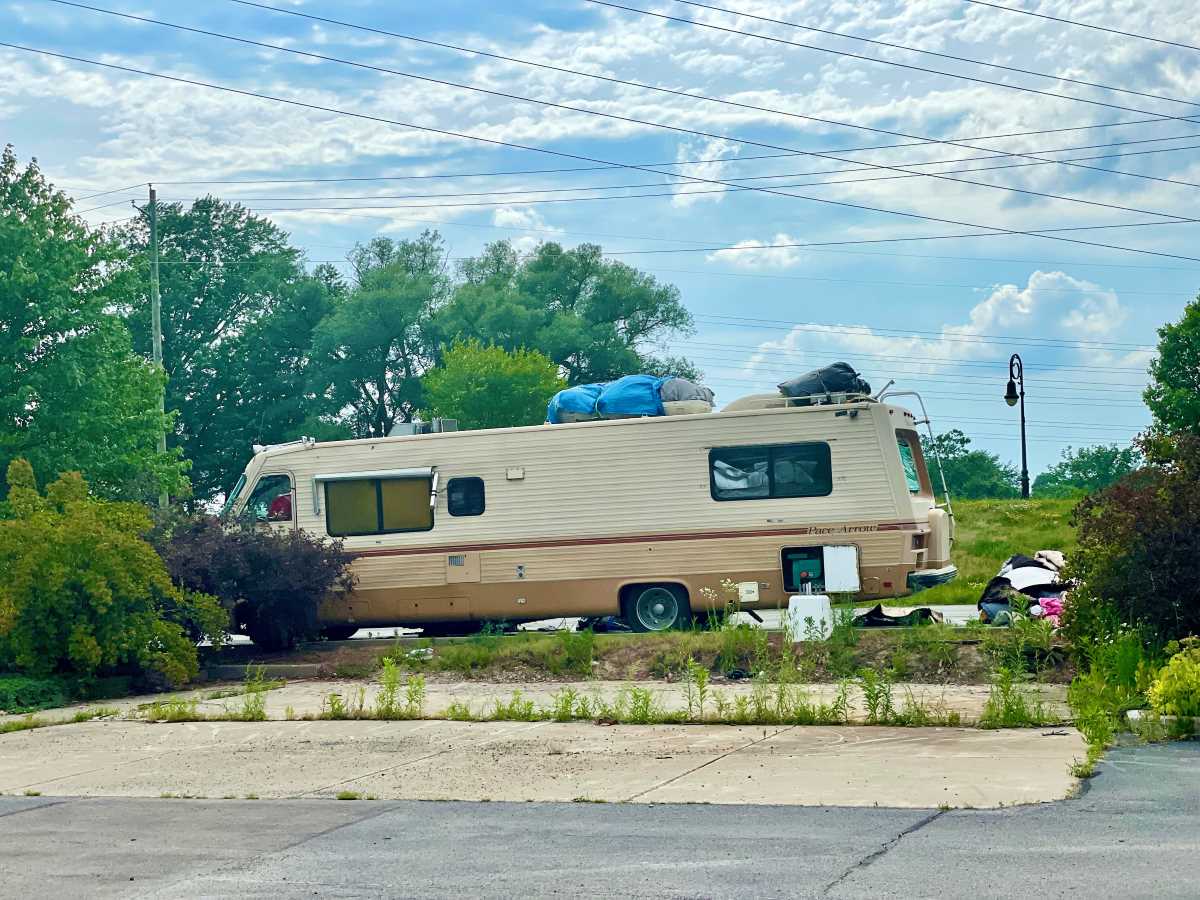As COVID-19 starts to wane, several cities across the country are increasing “poverty tows” and putting people experiencing vehicular homelessness at risk of becoming unsheltered.
Living in a vehicle already exposes an individual to several dangers. (Watch our short film “Mobile” based on true life events). Some of these include physical ailments such as developing back pain, other musculoskeletal problems, and declining mental health.
For people experiencing homelessness, the risks that come from being evicted from a vehicle are dramatically increased.
While self-styled “nomads” may have the funds to retrieve their belongings from impound, people experiencing homelessness often do not. In turn, they must re-accumulate belongings they had stored, thereby increasing their sense of desperation and the likelihood of being arrested for petty crimes.
In Pensacola, Florida, advocates and city officials have been debating since January how to best handle an encampment underneath Interstate 110. Several camp residents live in their vehicles, which city residents continuously report as either “suspicious” or “illegally parked.”
Back in April, Pensacola code enforcement officers slapped red warning signs on several of the vehicles. The signs said that the vehicles would be towed and impounded if they were not gone within five days.
Following the event, advocates and the city struck a deal to allow the encampment to remain for another 20 days. Before that timeframe expired, Pensacola’s city council agreed to a 90-day moratorium while the city finds other ways to provide shelter.
Pensacola officials also announced its intent to spend up to $3 million to expand the city’s homeless shelter system. The city developed a “homeless reduction task force” designed to connect individuals with services. The task force was first deployed on June 23 and visited the camp under I-110.
Michael Kimberl, director of the Ashford-Washington Center in Pensacola, said evicting these people could threaten their ability to escape homelessness in the future.
“If the vehicles were to get impounded, the chances are they’d never get their vehicles back again, and they’ll just fall further into homelessness,” he said.
Across the country in Flagstaff, Arizona, wildfire concerns and forest closures are forcing city officials to remove people who usually sleep on the pull-off roads in the state’s national forests.
Many of these people are experiencing homelessness, while others are tourists, outdoor enthusiasts, and self-styled “nomads.”
One Walmart manager on Flagstaff’s west side has seen enough of “the post-forest-closure” crowds in the store’s parking lot. He said he asked city officials to let the people living there know “they’re not allowed here.” Soon after that, cars began receiving 24-hour notices to vacate the property.
Flagstaff ordinances give private property owners the right to decide who can sleep in their parking lots overnight.
Flagstaff Police Department spokesperson Odis Brockman said officers are simply following the law when they evict people sleeping in their vehicles. However, “the police department is not proactively approaching campers on private property and telling them they need to leave unless there has been a request from the property owner to assist with a trespassing issue,” Brockman added.
Many people—some who had parked at Walmart for nearly a month—said they would comply with the order to move along. But, few of them reported knowing where they’d go next.
In the Pacific Northwest, officials in rural Washington struggle to find solutions for people living in cars and RVs in the Wenatchee Valley. There were as many as 30 vehicles parked there over the winter.
Wenatchee Police Capt. Edgar Reinfeld said the “problem” is capturing the public’s eye. Now they’re calling his officers to remove the vehicles with increasing frequency.
On July 2, a 43-year-old man was arrested at the Wenatchee Valley encampment. The person reportedly declined to be placed in housing or mental health services. All of the person’s belongings were confiscated, and their car was impounded.
“This isn’t something we want to do,” said Wenatchee Police Department Capt. Brian Chance. “The best place for [him] isn’t in jail, but someplace he can get housing and help.”
Some impoverished residents in San Francisco, California, are also living in fear of being evicted from their vehicles.
During the pandemic, the San Francisco Municipal Transportation Agency relaxed its parking enforcement to help vehicle owners. Individuals with registrations that expired less than six months ago and who accrued less than five parking tickets could live worry-free.
However, that all ended on June 28, when the agency rescinded the order. In response, advocates filed a lawsuit to stop the city’s planned restart of its enforcement.
The city argues its enforcement complies with basic parking policies, ensures emissions standards, and deters “bad actors”. Advocates argue it is a violation of the 4th Amendment protections against “warrantless seizures.”
Safe Parking Sites Help Address Mobile Homelessness
One way cities have addressed rising rates of vehicular homelessness is to adopt Safe Parking Sites. These are dedicated parking lots where people can park cars, campers, vans, and RVs. Additionally, these sites are often equipped with hygiene stations, electricity, drinking water, and weekly shower services.
According to the National League of Cities, Santa Barbara, California, was the first to adopt this policy in 2004. Since then, several cities have joined the ranks.
At the same time, NLC advises that “towing can further exacerbate financial strain for residents.”
“Unpaid fines and fees can quickly snowball, leading to escalated fines, driver’s license suspensions, or even jail time – making it nearly impossible for a resident to maintain employment and sometimes shelter,” the organization wrote on its website. “Low-income drivers are more likely to be assessed late fees and more citations related to their inability to pay. These challenges often have a disproportionate impact on residents of color.”
To help prevent people experiencing vehicular homelessness from becoming unsheltered, NCL suggests providing more notice before towing a car. Authorities should also provide the notice in more languages. Cities should also evaluate which parking enforcement or towing fees are necessary and which ones they can eliminate.
“This pandemic has transformed cities’ response to the state of homelessness, and as cities move from the response towards recovery, cities should take the lessons learned, prior and during COVID-19, to develop tailored interventions to assist the growing unsheltered, homeless population” NCL wrote.












